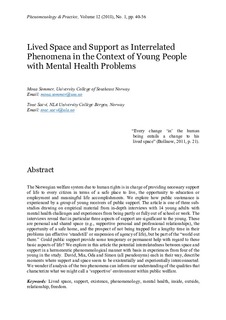| dc.contributor.author | Sommer, Mona | |
| dc.contributor.author | Sævi, Tone | |
| dc.date.accessioned | 2018-12-10T09:48:11Z | |
| dc.date.available | 2018-12-10T09:48:11Z | |
| dc.date.created | 2018-12-07T08:02:15Z | |
| dc.date.issued | 2018 | |
| dc.identifier.citation | Phenomenology & Practice. 2018, 12 (1), 40-56. | nb_NO |
| dc.identifier.issn | 1913-4711 | |
| dc.identifier.uri | http://hdl.handle.net/11250/2576815 | |
| dc.description | Phenomenology & Practice provides immediate open access to its content on the principle that making research freely available to the public supports a greater global exchange of knowledge. | nb_NO |
| dc.description.abstract | The Norwegian welfare system due to human rights is in charge of providing necessary support of life to every citizen in terms of a safe place to live, the opportunity to education or employment and meaningful life accomplishments. We explore how public sustenance is experienced by a group of young receivers of public support. The article is one of three substudies drawing on empirical material from in-depth interviews with 14 young adults with mental health challenges and experiences from being partly or fully out of school or work. The interviews reveal that in particular three aspects of support are significant to the young. These are personal and shared space (e.g., supportive personal and professional elationships), the opportunity of a safe home, and the prospect of not being trapped for a lengthy time in their problems (an effective ‘standstill’ or suspension of agency of life), but be part of the “world out
there.” Could public support provide some temporary or permanent help with regard to these basic aspects of life? We explore in this article the potential interrelatedness between space and support in a hermeneutic phenomenological manner with basis in experiences from four of the young in the study. David, Mia, Oda and Simon (all pseudonyms) each in their way, describe moments where support and space seem to be existentially and experientially interconnected. We wonder if analysis of the two henomena can inform our understanding of the qualities that characterize what we might call a supportive’ environment within public welfare. | nb_NO |
| dc.description.sponsorship | The project is funded by the Norwegian Extra Foundation for Health and Rehabilitation and The Norwegian Council for Mental Health. | nb_NO |
| dc.language.iso | eng | nb_NO |
| dc.rights | Navngivelse-Ikkekommersiell 4.0 Internasjonal | * |
| dc.rights.uri | http://creativecommons.org/licenses/by-nc/4.0/deed.no | * |
| dc.title | Lived Space and Support as Interrelated Phenomena in the Context of Young People with Mental Health Problems | nb_NO |
| dc.type | Journal article | nb_NO |
| dc.type | Peer reviewed | nb_NO |
| dc.description.version | publishedVersion | nb_NO |
| dc.rights.holder | 2018 Phenomenology & Practice publishes | nb_NO |
| dc.source.pagenumber | 40-56 | nb_NO |
| dc.source.volume | 12 | nb_NO |
| dc.source.journal | Phenomenology & Practice | nb_NO |
| dc.source.issue | 1 | nb_NO |
| dc.identifier.cristin | 1640116 | |
| cristin.unitcode | 222,56,3,0 | |
| cristin.unitname | Institutt for helse-, sosial- og velferdsfag | |
| cristin.ispublished | true | |
| cristin.fulltext | original | |
| cristin.qualitycode | 1 | |

